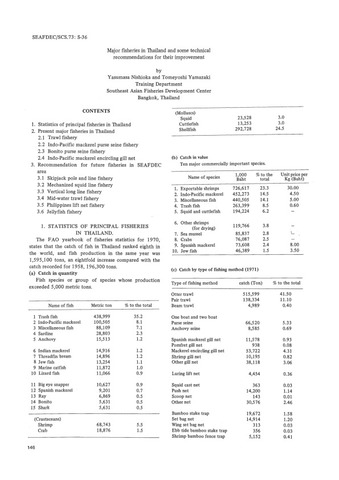Regional guidelines for responsible fisheries in Southeast Asia: Responsible fishing operations
Share
นามธรรม
The Code of Conduct for Responsible Fisheries was adopted at the FAO Conference in 1995 after four years of effort exerted by most of the countries that have a genuine interest in fisheries. This was a positive sign in the countries of the world that had committed their efforts to reconcile the unregulated fisheries practices with their grave concern on the current status of fisheries resources. It can be said that this new era of fisheries is harmonizing its development with the given aquatic environment to assure a sustainable status. All member countries of FAO are requested to implement the required commitment and actions under the framework of the internationally agreed Code of Conduct for Responsible Fisheries.
การอ้างอิง
SEAFDEC. (2000). Regional guidelines for responsible fisheries in Southeast Asia: Responsible fishing operations. Bangkok, Thailand: Secretariat, Southeast Asian Fisheries Development Center.
รายการที่เกี่ยวข้อง
แสดงรายการที่เกี่ยวข้องตามชื่อผู้แต่งผู้สร้างและเรื่อง
-
The Status of Fisheries in the Republic of Maldives
Faiz, Mohamed (Training Department, Southeast Asian Fisheries Development Center, 1997)The paper discusses the tuna fisheries in Maldives which dominates its fishing industry. Apart from a very strong domestic market, tuna is also the main export commodity of the country. Moreover, reef fisheries such as, ... -
Major fisheries in Thailand and some technical recommendations for their improvement
Nishioka, Yasumasa; Yamazaki, Tomeyoshi (Japan International Cooperation Agency, 1977)Presented in this paper is the development of fisheries industry in Thailand. The data on the production of the principal fisheries species and major fishing methods are also presented. Also included are the recommendations ... -
Status of Fishing Conditions in Cambodia
Sour, Kim; Vuthy, Ros (Training Department, Southeast Asian Fisheries Development Center, 1997)Fisheries in plays a very important role in Cambodia’s national economic development. Total fish catch production in 1996 was 104 310 tones, about which 60% was contributed by inland capture fisheries, 30% by marine capture ...





